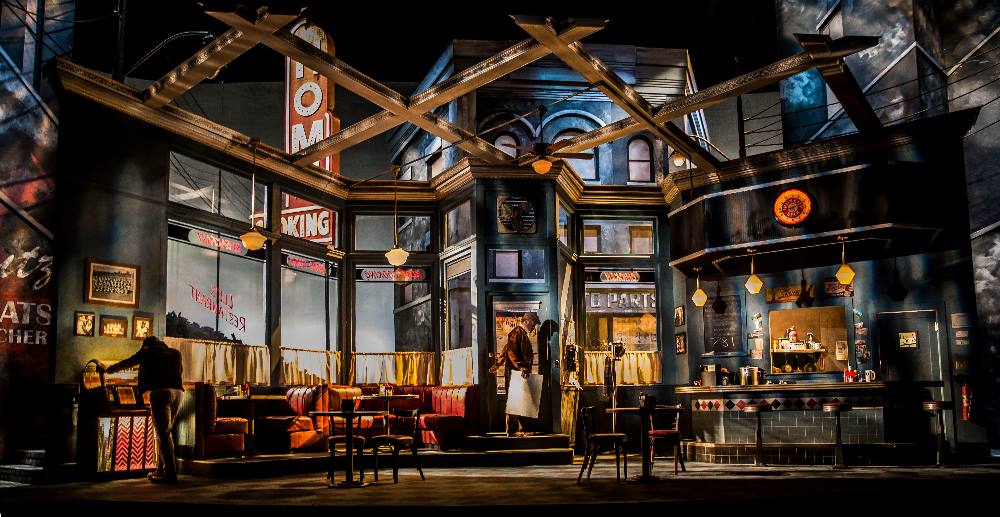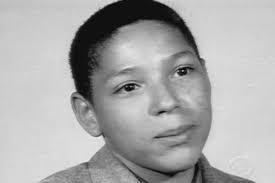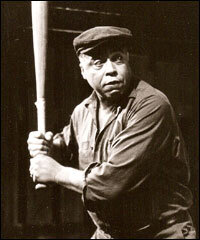The Pittsburgh Cycle, also known as the American Century Cycle, is August Wilson’s magnum opus, a series of ten plays that charts the African American experience throughout the twentieth century. “Put them all together,” Wilson once said, “and you have a history.” All of the plays are set in Pittsburgh’s Hill District except for Ma Rainey’s Black Bottom, which is set in Chicago.
Wilson didn’t actually plan to write a 10-play cycle. “I didn’t start out with a grand idea. I wrote a play called Jitney set in ’77 and a[n unpublished and unperformed] play called Fullerton Street that I set in ’41,” he told author and teacher Sandra Shannon. “Then I wrote Ma Rainey’s Black Bottom, which I set in ’27, and it was after I did that I said, ‘I’ve written three plays in three different decades, so why don’t I just continue doing that?’” (Fassler)
Characters in the plays often appear at different stages of their lives, with the offspring of previous characters cropping up in later plays. The figure of Aunt Ester features most often in the cycle. Other recurring elements include the use of music and the presence of an apparently mentally-impaired character; examples include Gabriel in Fences and Hedley in Seven Guitars.
Gem of the Ocean
Nominee, Tony Award, 2005
Gem of the Ocean is set in 1904 in the Pittsburgh home of Aunt Ester, a 285-year-old former slave and renowned cleanser of souls. A young man from Alabama visits her for help in absolving the guilt and shame he carries from a crime he’s committed, and she takes him on a journey of self-discovery to the City of Bones.
Joe Turner’s Come and Gone
Best Play, New York Drama Critics Circle
Nominee, Tony Award, 1988
Set in a Pittsburgh boardinghouse, Joe Turner’s Come and Gone tells the story of owners Seth and Bertha Holly and the makeshift family of migrants who pass through during the Great Migration of the 1910s.

Joe Turner’s Come and Gone at Yale Repertory Theatre. William B. Carter, 1986. Courtesy of Yale Repertory Theatre.
Ma Rainey’s Black Bottom
Best Play, New York Drama Critics Circle
Nominee, Tony Award, 1985
Set in 1927. Legendary blues singer Ma Rainey and her band players convene in a Chicago studio to record a new album. As their conversation unfolds, their bantering, storytelling and arguing raise questions of race, art and the historic exploitation of black recording artists by white producers. Ma Rainey’s Black Bottom is being released by Netflix in December, starring Viola Davis as Ma Rainey and Chadwick Boseman, in his last performance, as the young jazz musician Levee.
The Piano Lesson
Best Play, New York Drama Critics Circle
Pulitzer Prize for Drama, 1990
Nominee, Tony Award, 1990
The Piano Lesson is set in 1936 Pittsburgh during the aftermath of the Great Depression. The play deals with themes of family legacy. Brother and sister Boy Willie and Berniece Charles clash over whether or not they should sell an ancient piano that was exchanged for their great-grandfather’s wife and son in the days of slavery. The Piano Lesson was made into a Hallmark Hall of Fame movie in 1995, the first of Wilson’s plays to be filmed for a large audience.
Seven Guitars
Best Play, New York Drama Critics Circle
Nominee, Pulitzer Prize for Drama, 1995
Nominee, Tony Award, 1996
A blues singer just released from prison is asked to sign a record deal after a song he recorded months before becomes an unexpected hit in 1948. He is ready to right the past year’s wrongs and return to Chicago with a new understanding of what’s important in his life. Unfortunately his means of righting wrongs are inherently flawed.

A 2018 production of Seven Guitars by Miami’s M Ensemble Theatre
Fences
Best Play, New York Drama Critics Circle
Pulitzer Prize for Drama, 1987
Winner, Tony Award, 1987
Set in 1950s Pittsburgh, Fences tells the story of Troy Maxson, a restless trash-collector and former baseball athlete. Troy has gone through life in an America where to be proud and black is to face pressures that could crush a man, body and soul. But the 1950s are yielding to the new spirit of liberation in the 1960s, a spirit that is changing the world Troy has learned to deal with the only way he can, a spirit that is making him a stranger, angry and afraid, in a world he never knew and to a wife and son he understands less and less.
 Mary Alice, James Earl Jones and Courtney Vance in Fences at Yale Repertory Theatre. William B. Carter, 1985. Courtesy of Yale Repertory Theatre
Mary Alice, James Earl Jones and Courtney Vance in Fences at Yale Repertory Theatre. William B. Carter, 1985. Courtesy of Yale Repertory Theatre
Two Trains Running
Best Play, New York Drama Critics Circle
Nominee, Pulitzer Prize for Drama, 1992
Nominee, Tony Award, 1992
Two Trains Running is set in 1969. It tells the story of a local diner owner who fights to stay open as a municipal project encroaches on his establishment. His regulars must deal with racial inequality and the turbulent, changing times of the Civil Rights movement.
 Production of Two Trains Running at the Goodman Theatre in Chicago.
Production of Two Trains Running at the Goodman Theatre in Chicago.
Jitney
Best Play, New York Drama Critics Circle
Set in 1977 in a worn-down gypsy cab station, Jitney tells the story of men hustling to make a living driving jitneys — unofficial and unlicensed taxi cabs — because official cabs will not accept jobs in the Hill District, and what the company and its drivers must consider when the building housing the station is slated for destruction. Jitney is the only one of Wilson’s plays not to have been produced on Broadway during Wilson’s life, although it had been performed off-Broadway and overseas. It finally made its Broadway debut in 2017.

Jitney at True Colors Theatre, Atlanta 2010
King Hedley II
Nominee, Pulitzer Prize for Drama, 2000
Nominee, Tony Award, 2001
One of Wilson’s darkest plays, King Hedley II tells the story of an ex-convict trying to rebuild his life by selling stolen refrigerators so that he can save enough money to buy a video store during the trickle-down economic era of the 1980s and a decaying Hill District. Many of the characters have connections to the characters in Wilson’s 1940s-era play Seven Guitars, showing “how the shadows of the past can reach into the present.” (Samuel French playscript Overview)
Radio Golf
Best Play, New York Drama Critics Circle
Radio Golf is set in 1997 in Pittsburgh’s Hill District. Aunt Ester returns in this story of a charming, powerful African-American politician who is running for the highest office of his career with the support of his savvy wife. As he steps into political prominence, his plans to redevelop the Hill District collide with his past.
Sources
https://augustwilsonblog.wordpress.com/tag/the-greene-space
http://www.august-wilson-theatre.com/plays.php
https://www.thegreenespace.org/watch/11-things-you-should-know-about-august-wilson
https://ronfassler.medium.com/the-magic-of-august-wilson-d6da37dbcfec


 Young August Kittel went to parochial school near his Hill District home on Bedford Avenue until his parents’ divorce. He, his mother, and his siblings moved from their historically black community to the Oakland neighborhood, which was primarily white. The constant bigotry of classmates led him to change high schools three times by the time he was fifteen, when he withdrew from formal school and began educating himself independently at Pittsburgh’s famed Carnegie Library. In 1962, at age 17, he enlisted in the Army but left after a year of service. After his father’s death in 1965, he took the name August Wilson to honor his mother.
Young August Kittel went to parochial school near his Hill District home on Bedford Avenue until his parents’ divorce. He, his mother, and his siblings moved from their historically black community to the Oakland neighborhood, which was primarily white. The constant bigotry of classmates led him to change high schools three times by the time he was fifteen, when he withdrew from formal school and began educating himself independently at Pittsburgh’s famed Carnegie Library. In 1962, at age 17, he enlisted in the Army but left after a year of service. After his father’s death in 1965, he took the name August Wilson to honor his mother. Pittsburgh’s Carnegie Library c. 1935
Pittsburgh’s Carnegie Library c. 1935 , was selected in 1982. Through the Conference, Wilson was introduced to the artistic director of the Yale Repertory Theatre, Lloyd Richards, who nurtured trailblazing playwright Lorraine Hansberry, the author of A Raisin in the Sun and the first African-American to have a play produced on Broadway. Richards helped shepherd the development of Ma Rainey’s Black Bottom and ended up directing Wilson’s first six plays on Broadway, including the 1987 Pulitzer Prize-winning Fences. Wilson earned his second Pulitzer in 1990 for The Piano Lesson.
, was selected in 1982. Through the Conference, Wilson was introduced to the artistic director of the Yale Repertory Theatre, Lloyd Richards, who nurtured trailblazing playwright Lorraine Hansberry, the author of A Raisin in the Sun and the first African-American to have a play produced on Broadway. Richards helped shepherd the development of Ma Rainey’s Black Bottom and ended up directing Wilson’s first six plays on Broadway, including the 1987 Pulitzer Prize-winning Fences. Wilson earned his second Pulitzer in 1990 for The Piano Lesson.